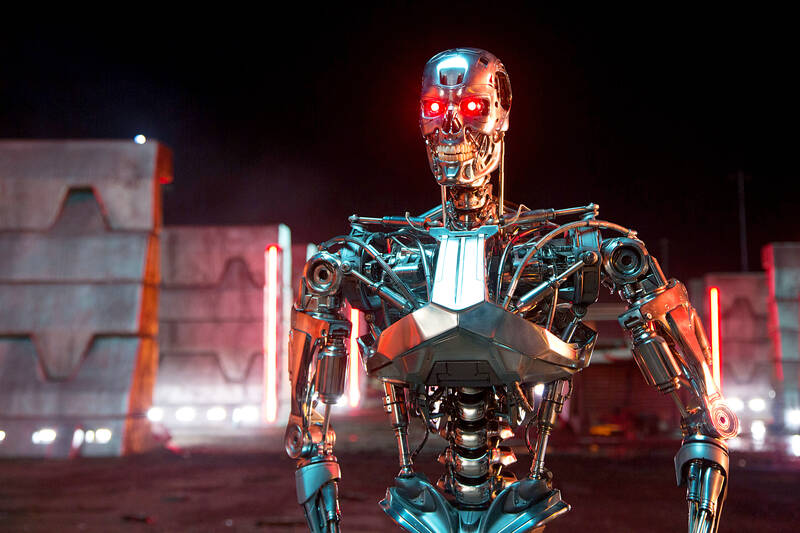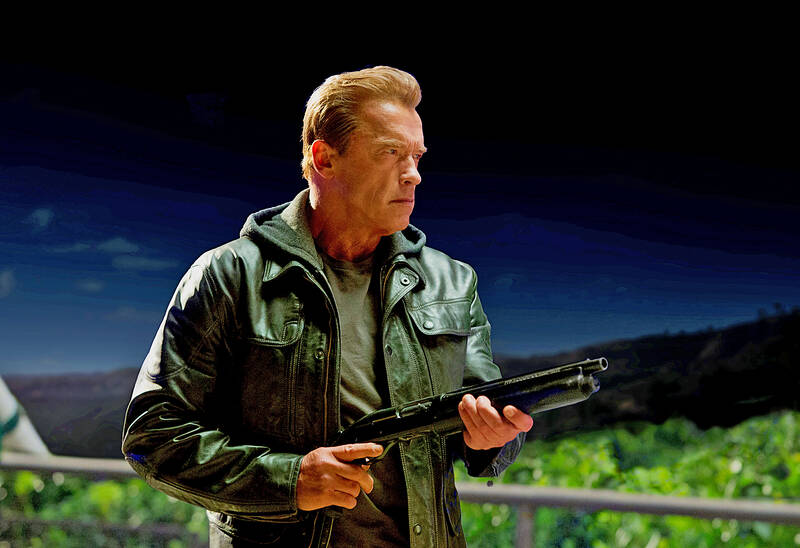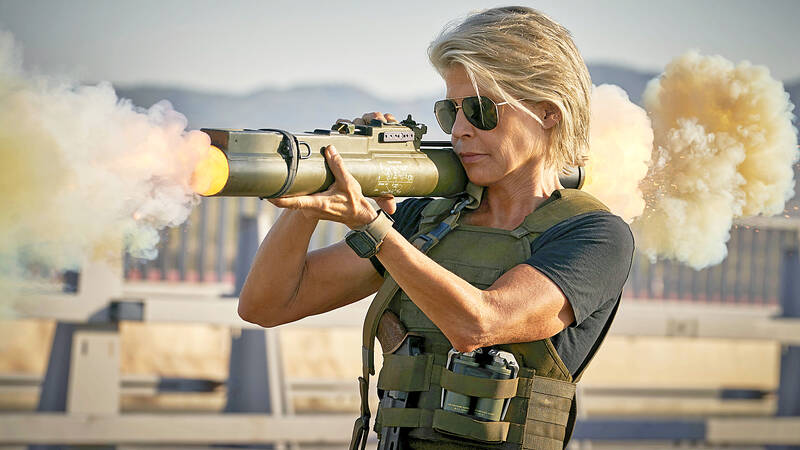James Cameron has a confession: he can’t write Terminator 7. And it’s not because Hollywood won’t let him, as he’s too busy making the new Avatar — it’s because reality keeps nicking his plotlines.
“I’m at a point right now where I have a hard time writing science-fiction,” Cameron told CNN this week. “I’m tasked with writing a new Terminator story [but] I don’t know what to say that won’t be overtaken by real events. We are living in a science-fiction age right now.”
It’s an understandable quandary for the veteran film-maker. Back in 1984, when the first Terminator movie came out, there was genuine shock value in the idea of a killer robot travelling through time from a future in which the wretched dregs of humanity survive in a chrome-plated hellscape dominated by their robot overlords. These days, the only far-fetched part of the movie is the bit where the T-800 turns up alone and completely naked, as opposed to arriving flanked by a swarm of AI-guided drones.

Photo: AP
We may not have achieved time travel just yet, but we do have artificial intelligences capable of quietly teaching themselves sarcasm, city-wide facial recognition and robot learning systems deciding who lives and dies. That’s the heart of Cameron’s problem: in 1984, Skynet was a terrifying piece of speculative fiction. In 2025, it’s basically LinkedIn with nukes. The creeping dread of AI isn’t a future shock any more; it’s the news cycle. From AI-powered spyware in our pockets to deepfake scams and voice-mimicking chatbots, the Terminator franchise no longer has the monopoly on making you want to hurl your hi-tech personal possessions into the sea.
Cameron seems to be caught between a rock and a hard place here, especially as this grand old sci-fi saga hasn’t exactly been blowing anyone’s CPU in well … decades. Terminator: Dark Fate, which the saga’s creator at least had a basic hand in developing, struggled at the 2019 box office despite the return of Linda Hamilton and a storyline that tried to mix the franchise’s classic “unstoppable hunter” formula with a reunion tour for its surviving stars. Before that, we have to go all the way back to 1991’s Terminator 2: Judgment Day to find a film that audiences really warmed to. The wilderness years between those two movies were littered with sequels that were too bleak, or too daft.
What Cameron should be looking for is a complete system reboot to reinvigorate the saga in the way Prey brought fans back to Predator and Alien: Romulus restored interest in slimy Xenomorphs. All evidence suggests that the 70-year-old film-maker is far more interested in the current challenges surrounding AI, superintelligences and humankind’s constant efforts to destroy itself, which doesn’t exactly lend itself to the sort of back-to-basics, relentless-monsters-hunt-a-few-unlucky-humans-for-two-hours approach that has worked elsewhere. The challenge here seems to be to fuse Terminator’s core DNA — unstoppable cyborgs, explosive chase sequences and Sarah Connor-level defiance — with the occasionally rather more prosaic yet equally scary existential anxieties of 21st-century AI doom-mongering.

Photo: AP
So we may get Terminator 7: Kill List, in which a single, battered freedom fighter is hunted across a decimated city by a T-800 running a predictive policing algorithm that knows her next move before she does. Or T7: Singularity’s Mom, in which a lone Sarah Connor-type must protect a teenage coder whose chatbot will one day evolve into Skynet. Or Terminator 7: Terms and Conditions, in which humanity’s downfall comes not from nuclear warfare but from everyone absent-mindedly agreeing to Skynet’s new privacy policy, triggering an army of leather-clad enforcers to collect on the fine print.
Or perhaps the future just looks terrifying enough without Cameron getting involved — which, rather worryingly for the future of the franchise, seems to be the director’s essential point. Then again, if anyone can make the apocalypse feel even worse than it already does, it’s the man who previously convinced us that autonomous drones would hunt humans from the sky and that machines would learn to think and kill for themselves. We should have confidence he can do it again.

Photo: AP

The primaries for this year’s nine-in-one local elections in November began early in this election cycle, starting last autumn. The local press has been full of tales of intrigue, betrayal, infighting and drama going back to the summer of 2024. This is not widely covered in the English-language press, and the nine-in-one elections are not well understood. The nine-in-one elections refer to the nine levels of local governments that go to the ballot, from the neighborhood and village borough chief level on up to the city mayor and county commissioner level. The main focus is on the 22 special municipality

The People’s Republic of China (PRC) invaded Vietnam in 1979, following a year of increasingly tense relations between the two states. Beijing viewed Vietnam’s close relations with Soviet Russia as a threat. One of the pretexts it used was the alleged mistreatment of the ethnic Chinese in Vietnam. Tension between the ethnic Chinese and governments in Vietnam had been ongoing for decades. The French used to play off the Vietnamese against the Chinese as a divide-and-rule strategy. The Saigon government in 1956 compelled all Vietnam-born Chinese to adopt Vietnamese citizenship. It also banned them from 11 trades they had previously

Jan. 12 to Jan. 18 At the start of an Indigenous heritage tour of Beitou District (北投) in Taipei, I was handed a sheet of paper titled Ritual Song for the Various Peoples of Tamsui (淡水各社祭祀歌). The lyrics were in Chinese with no literal meaning, accompanied by romanized pronunciation that sounded closer to Hoklo (commonly known as Taiwanese) than any Indigenous language. The translation explained that the song offered food and drink to one’s ancestors and wished for a bountiful harvest and deer hunting season. The program moved through sites related to the Ketagalan, a collective term for the

As devices from toys to cars get smarter, gadget makers are grappling with a shortage of memory needed for them to work. Dwindling supplies and soaring costs of Dynamic Random Access Memory (DRAM) that provides space for computers, smartphones and game consoles to run applications or multitask was a hot topic behind the scenes at the annual gadget extravaganza in Las Vegas. Once cheap and plentiful, DRAM — along with memory chips to simply store data — are in short supply because of the demand spikes from AI in everything from data centers to wearable devices. Samsung Electronics last week put out word